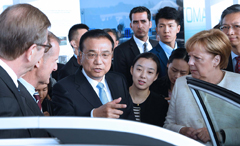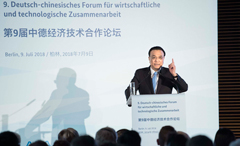Premier Li eyes German link in emerging sectors
2018-07-11
China Daily
Premier Li Keqiang called for better aligning innovation strategies between China and Germany in emerging industries such as artificial intelligence, new energy vehicles and self-driving technologies to promote the sectors and explore bigger markets.
Premier Li made the call on July 9 at the China-Germany Economic and Technical Cooperation Forum, also attended by German Chancellor Angela Merkel, before he headed back to Beijing late on July 10. More than 400 people attended the forum.
Germany is a leading country in basic research, innovation and high-end research and development, and China has special advantages in its huge market size, vast human resources, fast-growing digital economy and innovation applications, Premier Li said. Therefore, he said, both countries can work together more closely in innovation-driven development, particularly in electric vehicles and smart manufacturing.
More than 7,000 German companies and more than 2,000 Chinese companies have made investments in each other’s markets, leading to cumulative investments of $40 billion by the two countries, Premier Li said. Moreover, the countries have forged a strong partnership in innovation beyond their traditional cooperation, he said.
German companies have earned considerable profits by investing in China and now are welcome to expand their investments in the world’s second-largest economy, which is opening its door wider and improving the business environment, Premier Li said.
Premier Li called on Germany to loosen restrictions over exporting high-tech products to China.
China is seeing accelerated transformation in its domestic consumption and industrial upgrading, which provides great prospects for German companies to export their high-end equipment and quality services, Premier Li said.
Economic and technical cooperation cannot be promoted without an open and free environment, Li said. The multilateral trading system based on the World Trade Organization has to be respected and safeguarded, Premier Li said. He added that China and Germany had reiterated their support for free trade and the fight against protectionism in any form.
Merkel said bilateral cooperation has spread to emerging areas, such as artificial intelligence and electric vehicles, and Germany welcomes more investments by Chinese companies. Germany would like to work with China to support free trade and fight against trade protectionism, she added.
Merkel has been to China more than 10 times and both countries maintain frequent high-level exchanges, said Ruan Zongze, vice-president of the China Institute of International Studies.
Germany is China’s largest trading partner in the EU, and the two countries have their own advantages in emerging industries, Ruan said. Li’s visit brought a blueprint for bilateral ties in coming years and consolidation of political trust to enable them to better understand each other, he added.


